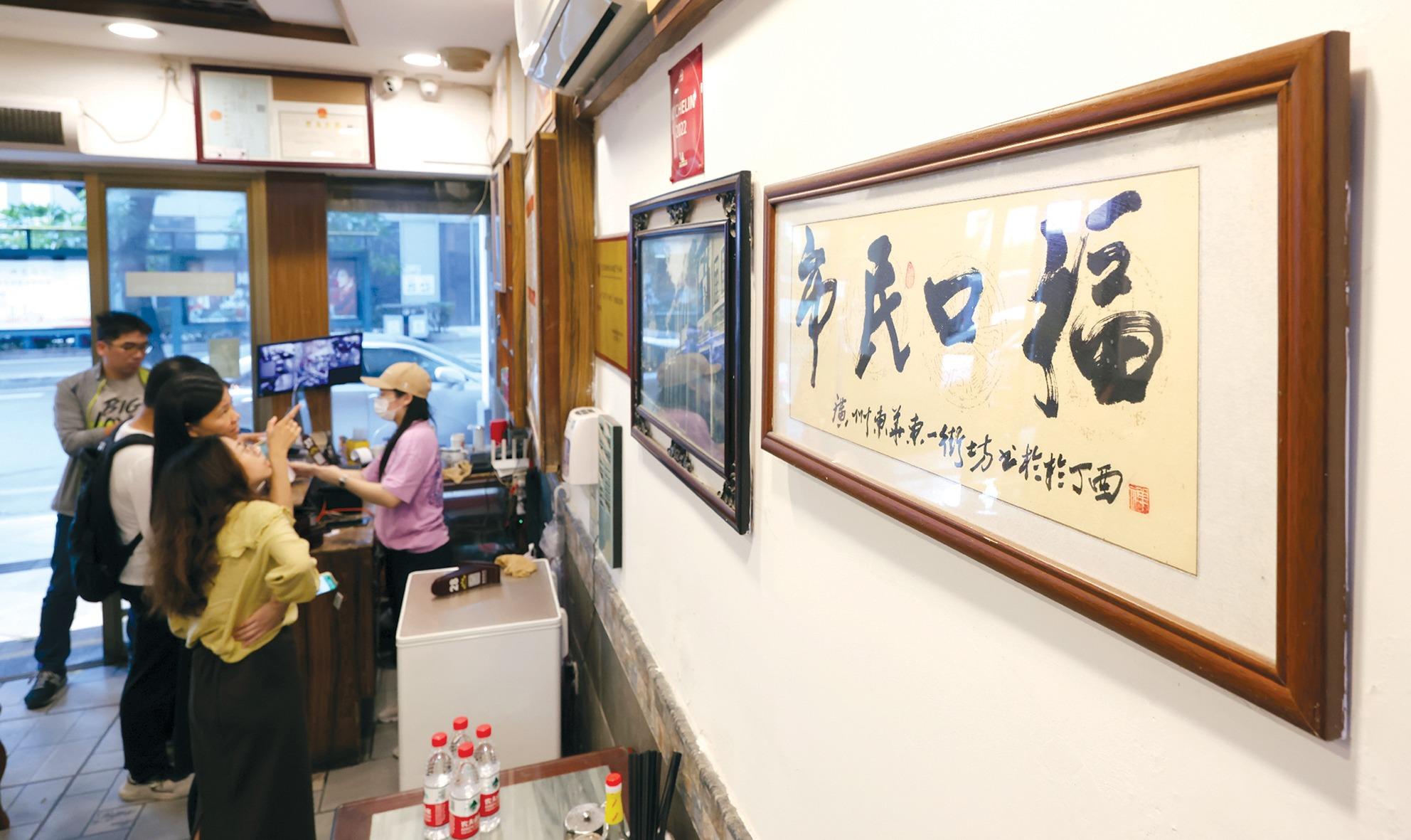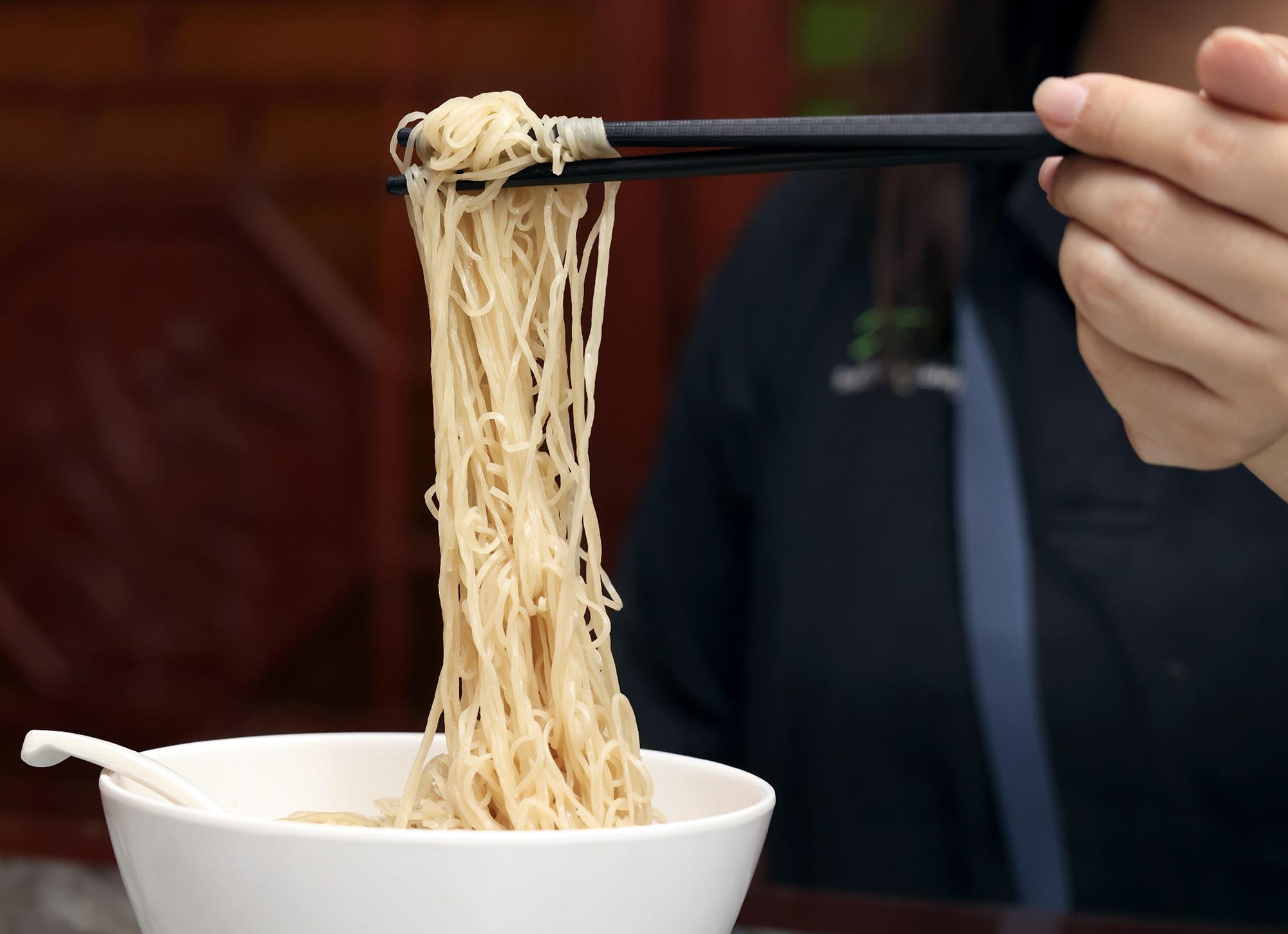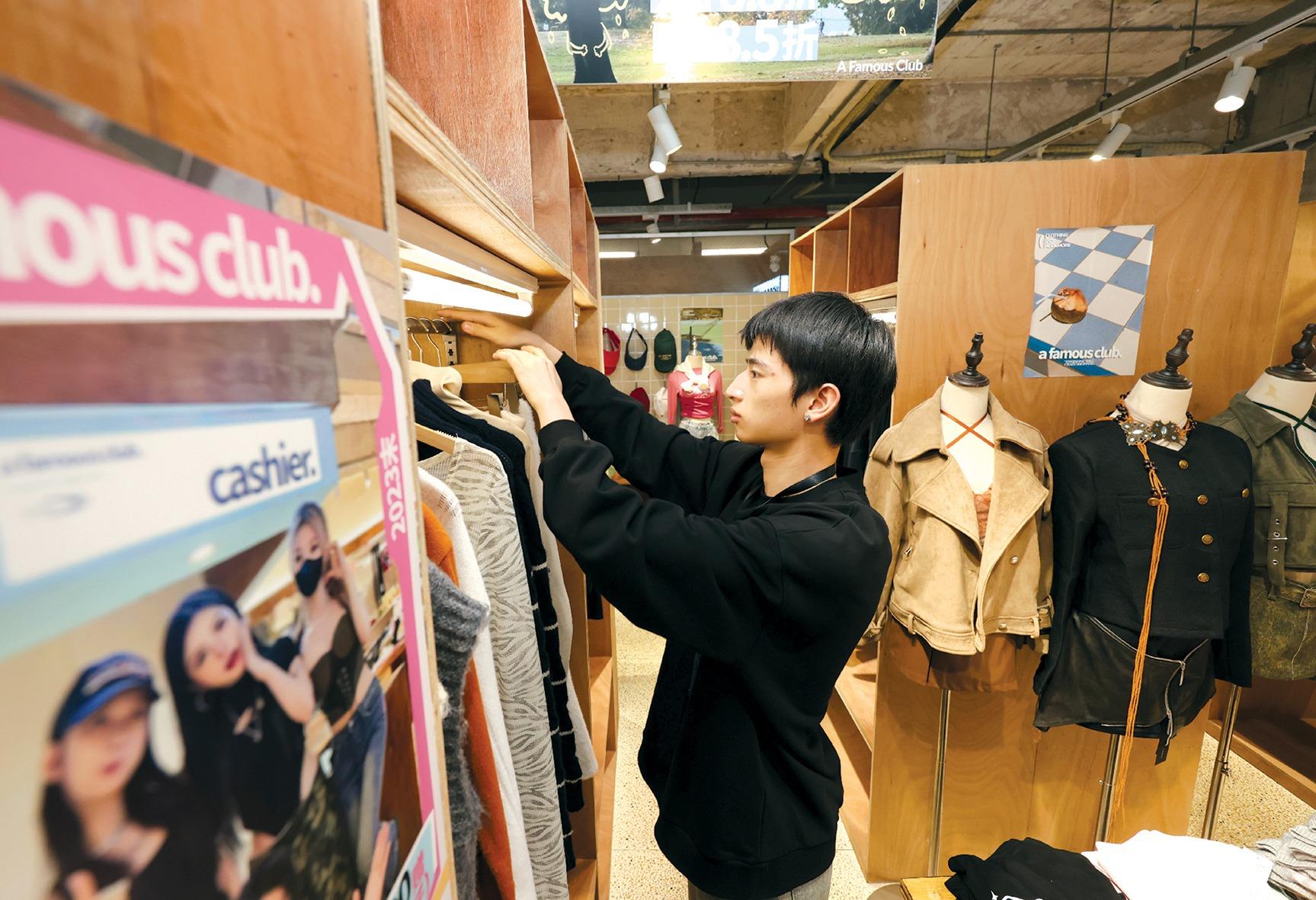 Customers view a photo of Enning Liu Fiji’s old shop in Guangzhou’s Liwan district while lining up to place their order in the wonton noodle restaurant’s present site in Dongshankou in November, 2023. (PARKER ZHENG / CHINA DAILY)
Customers view a photo of Enning Liu Fiji’s old shop in Guangzhou’s Liwan district while lining up to place their order in the wonton noodle restaurant’s present site in Dongshankou in November, 2023. (PARKER ZHENG / CHINA DAILY)
Unlike a simplistic and standardized mode of transformation, the revitalization of Guangzhou’s Dongshankou — the Guangdong provincial capital’s largest Western-style building complex, which is regarded as a model of entrepreneurial innovation — was mainly driven by local residents and businesses.
The complex has provided an inclusive and vibrant incubation space for aspiring entrepreneurs. Within just a few years, it has welcomed a string of young people who have set up their original consumer brands. Among them is He Chulun.
Born and raised in Dongshankou, He has witnessed a growing influx of young people, attracted by the area’s special features and picturesque environment. In 2020, He launched his own multibrand boutique 3MODE in the neighborhood, capitalizing on the abundant opportunities on offer.
His brand principally involves fashion retailing but, in the evenings, the shop becomes a semi-outdoor bar, providing an alfresco dining and drinking setting.
3MODE’s business model has fared well, and has grown into a chain of seven stores operating in major cities on the Chinese mainland, including Shanghai, Chengdu in Sichuan province, and Changsha in Hunan province. According to He, his store’s monthly revenue in Dongshankou can reach as much as 800,000 yuan ($111,918).
“This neighborhood is an excellent breeding ground for budding enterprises, providing a launching pad for ventures to take root and eventually expand nationwide,” says He.
 A close-up of the restaurant’s time-honored specialty — springy noodles made from duck eggs and flour. (PARKER ZHENG / CHINA DAILY)
A close-up of the restaurant’s time-honored specialty — springy noodles made from duck eggs and flour. (PARKER ZHENG / CHINA DAILY)
According to commercial real-estate services provider RET, the number of multibrand clothing stores on the mainland has grown rapidly — up from about 300 in late 2017 to more than 5,000 by 2021.
Dongshankou’s burgeoning popularity has spawned intense competition, pushing shop rentals sky-high. In the past few years, the annual rental for a shop in the neighborhood has surged threefold, according to He. But, to the young entrepreneur, there is an urgency to raise the profile of Chinese fashion brands to a broader stage, citing Hongdae in Seoul, South Korea and Harajuku in Tokyo, Japan — business districts internationally renowned for their fashion culture. “I believe we can have a similar business in China, especially in Guangzhou. I intend to create such a vibrant district showcasing the unique fashion and culture of China’s young people.”
As new and exciting enterprises make a beeline for Dongshankou, time-honored businesses specializing in traditional craftsmanship are also witnessing a rejuvenation. Located in Donghua East Road at Dongshankou, wonton noodle restaurant Enning Liu Fuji is a favorite among foodies from all walks of life because of its affordable prices and delectable flavors.
Founder Liu Fuji started a shop in the 1940s on Enning Road at a spot right across from today’s Yongqingfang in Liwan district. Since Liu’s retirement in 1998, the business has been run by his son Liu Gaowen, who started making noodles as a child.
 A staff member arranges clothes at a fashion boutique in Dongshankou. Numerous fashion brands aiming to capitalize on the renovated and vigorous area’s abundant opportunities have been launched over the past few years. (PARKER ZHENG / CHINA DAILY)
A staff member arranges clothes at a fashion boutique in Dongshankou. Numerous fashion brands aiming to capitalize on the renovated and vigorous area’s abundant opportunities have been launched over the past few years. (PARKER ZHENG / CHINA DAILY)
Paving the way for passing on the family’s craftsmanship in making noodles, Liu bought an old house in Dongshankou in 2014 from an American overseas Chinese, and eventually set up a shop there. His wonton noodles have a distinct flavor — they are made with duck eggs and flour, and keeping the ideal texture, consistency and flavor of the noodles requires precise cooking techniques, timing and mastery of heat control. The process involves careful monitoring of the time of boiling the noodles for between 10 and 15 seconds, ensuring they are cooked to the right degree of tenderness, while maintaining their springy texture.
“The must-try blanched noodles tossed in lard is simple, but addictive. The shrimp wontons are big and bursting with seafood flavor,” Michelin Guide wrote in its 2023 edition.
First-time diners may be surprised at being able to taste such a bowl of noodles for a mere 17 yuan — a price that hasn’t been raised even after Michelin’s recommendation. Despite the large number of customers at the restaurant, Liu says the income is “just so-so” due to the high costs of the ingredients. “What I want to do is to make our noodles known to more people. I’m focused on achieving this goal instead of just making money,” says Liu.
The entrepreneur, now in his 70s, has to get up at 6:30 am every day and kneads the dough himself to ensure the quality is maintained. “But I can’t do this forever,” he says.
“I’m glad to see more young people visiting Dongshankou. Our generation will eventually fade away. So, when a family takes their young children to dine here, I often ask the children if they enjoy the food. Most of them said they are fond of it, and that gives me great joy.”
“This cultural heritage has to be extended. People in their 40s are familiar with it, but younger generations may not be aware of its existence.”


